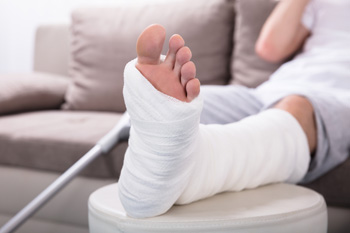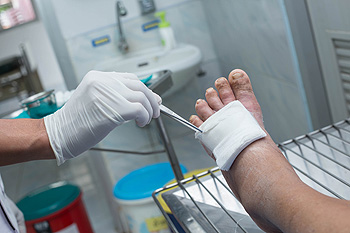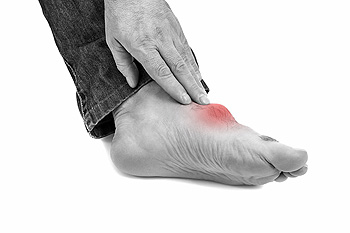Items filtered by date: October 2020
What Can I Do to Manage My Gout?
If you have ever experienced a gout attack, then you are familiar with the sudden pain and swelling that this condition can cause in the joints of the feet. Fortunately, there are several ways to manage gout. Your doctor may prescribe specific medications or injections to minimize the joint pain, swelling, and inflammation caused by gout. Lifestyle factors can also play a role in managing this condition. Avoiding foods that are high in purines, such as organ meats and seafood, and staying well-hydrated by drinking plenty of water can help reduce the frequency of attacks. Immobilizing and elevating the affected foot may also help you find relief, as resting your foot can decrease swelling. For more information on how to best manage gout, consult with a podiatrist today.
Gout is a foot condition that requires certain treatment and care. If you are seeking treatment, contact Dr. Joshua David Scoll from Pennsylvania. Our doctor will treat your foot and ankle needs.
What Is Gout?
Gout is a type of arthritis caused by a buildup of uric acid in the bloodstream. It often develops in the foot, especially the big toe area, although it can manifest in other parts of the body as well. Gout can make walking and standing very painful and is especially common in diabetics and the obese.
People typically get gout because of a poor diet. Genetic predisposition is also a factor. The children of parents who have had gout frequently have a chance of developing it themselves.
Gout can easily be identified by redness and inflammation of the big toe and the surrounding areas of the foot. Other symptoms include extreme fatigue, joint pain, and running high fevers. Sometimes corticosteroid drugs can be prescribed to treat gout, but the best way to combat this disease is to get more exercise and eat a better diet.
If you have any questions please feel free to contact one of our offices located in Philadelphia, Bensalem, and Fairless Hills, PA . We offer the newest diagnostic and treatment technologies for all your foot and ankle needs.
Are You Suffering From Ingrown Toenails?
Effects of Trauma to the Feet
 There are many factors that can go into why a person’s feet may be experiencing pain, one of which is trauma. When trauma or injury occurs to the foot, various complications may develop. The injured foot may begin to swell, feel tender, bruise, and become difficult to walk on. Trauma may also cause the foot, toes, and lower extremity regions to sprain or break. In order to properly treat trauma to the foot, it’s important that you get examined by a podiatrist who can give you a professional diagnosis, and determine the best treatment option to relieve your pain. If you have experienced trauma or injury to your foot, please consult with a podiatrist as soon as possible for prompt treatment.
There are many factors that can go into why a person’s feet may be experiencing pain, one of which is trauma. When trauma or injury occurs to the foot, various complications may develop. The injured foot may begin to swell, feel tender, bruise, and become difficult to walk on. Trauma may also cause the foot, toes, and lower extremity regions to sprain or break. In order to properly treat trauma to the foot, it’s important that you get examined by a podiatrist who can give you a professional diagnosis, and determine the best treatment option to relieve your pain. If you have experienced trauma or injury to your foot, please consult with a podiatrist as soon as possible for prompt treatment.
Foot and ankle trauma is common among athletes and the elderly. If you have concerns that you may have experienced trauma to the foot and ankle, consult with Dr. Joshua David Scoll from Pennsylvania. Our doctor will assess your condition and provide you with quality foot and ankle treatment.
Foot and ankle trauma cover a range of injuries all over the foot; common injuries include:
- Broken bones
- Muscle strains
- Injuries to the tendons and ligaments
- Stress fractures
Symptoms
Symptoms of foot and ankle injuries vary depending on the injury, but more common ones include:
- Bruising
- Inflammation/ Swelling
- Pain
Diagnosis
To properly diagnose the exact type of injury, podiatrists will conduct a number of different tests. Some of these include sensation and visual tests, X-rays, and MRIs. Medical and family histories will also be taken into account.
Treatment
Once the injury has been diagnosed, the podiatrist can than offer the best treatment options for you. In less severe cases, rest and keeping pressure off the foot may be all that’s necessary. Orthotics, such as a specially made shoes, or immobilization devices, like splints or casts, may be deemed necessary. Finally, if the injury is severe enough, surgery may be necessary.
If you have any questions, please feel free to contact one of our offices located in Philadelphia, Bensalem, and Fairless Hills, PA . We offer the newest diagnostic and treatment technologies for all your foot care needs.
What Kind of Shoe Should I Work Out In?
 When it comes to working out, one of the most important accessories you can have is a pair of workout shoes designed for the type of exercise you like to practice. For example, if you’re going to be practicing weight lifting, you’re not going to want to wear thick-soled running shoes. Weight-lifting is best practiced with flat-soled shoes as they help with keeping proper form, and provide a firm grip on the ground. Cardio and strength training require a different style of shoe. Because you’ll be constantly moving and jumping around, you’ll want a shoe with extra cushion and support, as well as a wide toe. For professional advice on which shoes you should be wearing while working out, please speak with a podiatrist.
When it comes to working out, one of the most important accessories you can have is a pair of workout shoes designed for the type of exercise you like to practice. For example, if you’re going to be practicing weight lifting, you’re not going to want to wear thick-soled running shoes. Weight-lifting is best practiced with flat-soled shoes as they help with keeping proper form, and provide a firm grip on the ground. Cardio and strength training require a different style of shoe. Because you’ll be constantly moving and jumping around, you’ll want a shoe with extra cushion and support, as well as a wide toe. For professional advice on which shoes you should be wearing while working out, please speak with a podiatrist.
Finding a properly-fitting shoe is important in reducing injuries and preventing foot problems. For more information about treatment, contact Dr. Joshua David Scoll from Pennsylvania. Our doctor will treat your foot and ankle needs.
Proper Shoe Fitting
A common concern when it comes to foot health, having properly fitted shoes can help prevent injuries to the foot. Out feet affect our posture and gait, which in turn affects the biomechanics and overall bodily structure. With 33 joints, 26 bones, and over 100 ligaments, the potential for serious injury is much greater than one realizes. Although the feet cease growth in adulthood, they still change shape as they mature. Here are some factors to consider when it comes to investing in proper fitting shoes:
- Be sure the shoes fit correctly right away
- Ensure the ball of your foot fits comfortably in the widest portion of the shoes
- Even though they may look fashionable, improper fitting shoes can either create adverse conditions or exacerbate existing ones you may already have
- Walk along a carpeted surface to ensure the shoes comfortably fit during normal activity
Keeping in mind how shoes fit the biomechanics of your body, properly-fitting shoes are vitally important. Fortunately, it is not difficult to acquire footwear that fits correctly. Be sure to wear shoes that support the overall structure of your body. Do your feet a favor and invest in several pairs of well-fitted shoes today.
If you have any questions please feel free to contact one of our offices located in Philadelphia, Bensalem, and Fairless Hills, PA . We offer the newest diagnostic and treatment technologies for all your foot and ankle needs.
Treatments for Diabetic Foot Ulcers
 Diabetic foot ulcers are open wounds that typically form on the bottom of the feet in people with diabetes. These wounds generally heal slowly and are prone to infection. They also tend to recur even after they have healed. There are various treatments available for diabetic foot ulcers, including removing or minimizing weight placed on the foot, called offloading, and taking antibiotics for infections. Sometimes, removing dead tissue around the ulcer, a process called debridement, may be necessary. Utilizing a patient-centered approach is necessary for selecting appropriate treatments and achieving best possible outcomes. For more information about treatments for diabetic foot ulcers, consult with a podiatrist today.
Diabetic foot ulcers are open wounds that typically form on the bottom of the feet in people with diabetes. These wounds generally heal slowly and are prone to infection. They also tend to recur even after they have healed. There are various treatments available for diabetic foot ulcers, including removing or minimizing weight placed on the foot, called offloading, and taking antibiotics for infections. Sometimes, removing dead tissue around the ulcer, a process called debridement, may be necessary. Utilizing a patient-centered approach is necessary for selecting appropriate treatments and achieving best possible outcomes. For more information about treatments for diabetic foot ulcers, consult with a podiatrist today.
Wound care is an important part in dealing with diabetes. If you have diabetes and a foot wound or would like more information about wound care for diabetics, consult with Dr. Joshua David Scoll from Pennsylvania. Our doctor will assess your condition and provide you with quality foot and ankle treatment.
What Is Wound Care?
Wound care is the practice of taking proper care of a wound. This can range from the smallest to the largest of wounds. While everyone can benefit from proper wound care, it is much more important for diabetics. Diabetics often suffer from poor blood circulation which causes wounds to heal much slower than they would in a non-diabetic.
What Is the Importance of Wound Care?
While it may not seem apparent with small ulcers on the foot, for diabetics, any size ulcer can become infected. Diabetics often also suffer from neuropathy, or nerve loss. This means they might not even feel when they have an ulcer on their foot. If the wound becomes severely infected, amputation may be necessary. Therefore, it is of the upmost importance to properly care for any and all foot wounds.
How to Care for Wounds
The best way to care for foot wounds is to prevent them. For diabetics, this means daily inspections of the feet for any signs of abnormalities or ulcers. It is also recommended to see a podiatrist several times a year for a foot inspection. If you do have an ulcer, run the wound under water to clear dirt from the wound; then apply antibiotic ointment to the wound and cover with a bandage. Bandages should be changed daily and keeping pressure off the wound is smart. It is advised to see a podiatrist, who can keep an eye on it.
If you have any questions, please feel free to contact one of our offices located in Philadelphia, Bensalem, and Fairless Hills, PA . We offer the newest diagnostic and treatment technologies for all your foot care needs.


